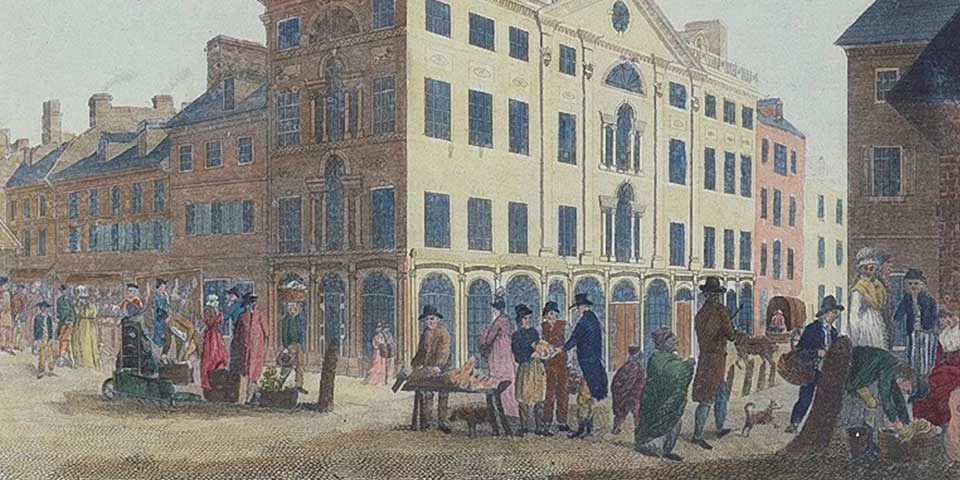Part of a series of articles titled The Constitutional Convention: A Day by Day Account for June 1787.
Article
June 30, 1787: Fireworks of All Sorts

"South East corner of Third, and Market Streets. Philadelphia" by William Birch, 1800.
Independence National Historical Park.
APPARATUS. July the 4th, being the anniversary of AMERICAN INDEPENDENCE, will be erected, opposite the City Tavern in Second Street, the most elegant FIRE WORKS, That ever had been exhibited; not labor or expense will be spared to gratify the curiosity of the spectators; and to prevent accidents, there will be no rockets.
Tickets to be had at the City Tavern, at 7s 6d, each, without which, no person will be admitted to the aforesaid City Tavern.
Contentious debate marked the day's proceedings.
Brearley (NJ), second by Paterson (NJ), moved that the President write New Hampshire ..."that the business depending before the Convention was of such a nature as to require the immediate attendance of the deputies of that state." This motion indicated that the small states wanted reinforcements. Rutledge (VA), King (MA) and Wilson (PA) opposed the motion, and it lost.
Debate on Ellsworth's motion for an equal vote in the Senate resumed with increasing acrimony. Dr. Franklin proposed a compromise - an equal vote in the Senate for each state except on appropriations and tax bills. The vote on these to be proportioned to the money provided by each state. He was ignored.
Debate continued, with neither side yielding. Gunning Bedford (DE) then delivered perhaps the harshest speech of the debates thus far. Why not simply give Congress the power it needed? "The large states dare not dissolve the confederation. If they do, the small ones will find some foreign ally ..." Ellsworth (CT) said he looked to the states for preservation of his rights and for happiness.
King (MA) then closed the day's debate by acknowledging that the states should be preserved and by reprimanding Bedford for courting relief from a foreign power.
Synopsis
- Defeated (5 – 2 – 1) resolution to request that New Hampshire send its delegates
- Neither side yielded in debates over the compromise proposed by Ellsworth (CT)
- George Mason wrote Acting Governor Randolph, suggesting that Francis Corbin be appointed as a delegate in place of James McClurg, who had resigned. He added that two or three days would determine whether or not the Convention could agree on a sound and effectual system.
- It was a hot and partly cloudy day.
Last updated: November 16, 2019
